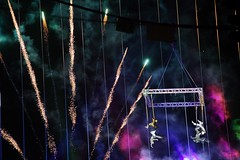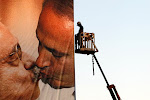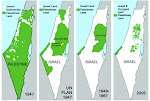Haredi hat-snatching gangs in Bnei Brak

Hang onto your hats, fellows. This is not conflict as we Israelis usually know it... it might have been inspired by a Dr Seuss plot. But maybe we can use the same strategy for peace settlements elsewhere, since the Road Map has folded and the Annapolis agreement is a non-starter. Buki Naeh, of Yediot Aharonot, lifts the lid on the furious fur hat snatching reportedly going on in Bnei Brak, a densely-packed ultra-orthodox city east of Tel Aviv.
(Where is PETA to sort them out??)
Rival gangs in the Viznits Hasidic community in Bnei Brak won't steal shekels or waste their breath in ideological arguments, Buki tells us. Instead, these Hasidic quarrelers swipe each others shtreimels and barter for their return. First some background: The shtreimel is a fur hat worn by many married haredi Jewish men belonging to one of the various Hasidic sects on Sabbath and holidays. The hat, like those once worn by Polish and Russian nobles, requires up to 30 skins-- preferably sable, mink, or fox. A Hasidic man buys one or two expensive shterimels throughout his life for a price range of $2,000 to $5,000. Fake fur shtreimels are available, especially inside Israel, but are frowned upon by traditionalists. Usually the bride's father purchases the shtreimel for a groom to wear at his wedding. Nowadays, it is customary to buy two shtreimels—a cheaper version (sells for $800-1,500), called the regn shtraml (rain shtreimel) is used for occasions where the expensive one may get damaged. But economy-minded family men often prefer shower caps or plastic bags to protect regn shtreimels on sodden Saturdays. Most of these hats are made in New York City, Montreal or Israel.
First some background: The shtreimel is a fur hat worn by many married haredi Jewish men belonging to one of the various Hasidic sects on Sabbath and holidays. The hat, like those once worn by Polish and Russian nobles, requires up to 30 skins-- preferably sable, mink, or fox. A Hasidic man buys one or two expensive shterimels throughout his life for a price range of $2,000 to $5,000. Fake fur shtreimels are available, especially inside Israel, but are frowned upon by traditionalists. Usually the bride's father purchases the shtreimel for a groom to wear at his wedding. Nowadays, it is customary to buy two shtreimels—a cheaper version (sells for $800-1,500), called the regn shtraml (rain shtreimel) is used for occasions where the expensive one may get damaged. But economy-minded family men often prefer shower caps or plastic bags to protect regn shtreimels on sodden Saturdays. Most of these hats are made in New York City, Montreal or Israel.
The shtreimel is worn without fastening, a significant factor in the latest street fights in the Viznits neighborhood. Those looking to humiliate a Hasid snatch his shterimel, forcing him to return home with a lowered head sporting only his yarmulke.
In recent weeks, the brawls between the camps have intensified, with both sides snatching each other’s shtreimels. During the peacemaking, each camp returns the other’s goods stolen in the latest strife.
The barters, one of which took place two weeks ago, also include returning torn shterimels that were intentionally spoiled and torn in the heat of battle in exchange for ones in mint condition.
In each fight, the Viznits Hassids try to snatch as many shterimels off their opponents’ heads, so as to have as many bargaining chips as possible ahead of the next barter.
An entire book can be written about the background leading to these street fights in the Viznits community. When Hasidic leader Rabbi Yehoshua Moshe Hagar fell ill, a world war was ignited between his sons – the elder Yisrael and the younger Menachem Mendel – on who will succeed him.
Mendel vs. Yisrael
Viznits Hasidism is divided between the “Yisraelists” following Rabbi Yisrael and “Mendelists” supporting Rabbi Menachem Mendel. The walls in Kiryat Viznits are filled with defamatory posters. Rabbi Yisrael controls the synagogue and the community institutions while Rabbi Mendel reigns over the neighborhood.
Until about six weeks ago, the status quo between the two camps had the Mendelists come to pray at the central synagogue of “Torat Chaim” only on Fridays. They would stand on their seats during the tish (a Hasidic gathering of Hasidim around their Rabbi) held by the ailing Rabbi.
But then the visiting Mendelists’ seats were broken down, and the Yisraelists prevented their entrance to the synagogue. In response, the Menedlists tried to stand on the Yisraelists’ seats, waging war once again.
The recent street fights – mainly during weekends – included more than 100 participants hitting each other and trying to grab the shterimels. One brawl follows another, sending dozens of people to hospital.
The police claim they are doing their best to calm the atmosphere, but they are ill at hand, as each camp complains the police is siding with its opponent. Legal counseling has recently been applied to the case, when Attorney Moshe Meroz was approached by some Mendelists. Meroz immediately sent a letter to the Tel Aviv Police, asking them to handle the pogroms issued by the Yisarelists against the Mendalists.
In his urgent letter, Meroz claims that the Mendelists’ complaints about the pogroms are not being handled by the police. He further says that hundreds of Yisraelists attacked Rabbi Mendel and his followers, beating them mercilessly – completely overlooked by the police.
Meroz ends his letter by saying that some 20 shterimels have yet to be returned to the Mendelists, and that real danger is at hand due to the police’s continued disregard of the matter.
The police responded by saying they were well aware of the strife and is handling the case without siding with either camp. The police also claim they have arrested Hasidim from both camps after the last fight.






































